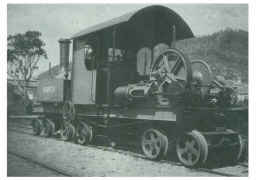
The steam locomotives built by this company were
generally a disaster. The early examples were adaptations of their log haulers with a
chain drive to the axles. They were mechanical monstrosities with short service lives,
but later Dispatch went on to develop successful rail tractors with such good results
that other manufacturers were unable to compete.
Usually with Dispatch designs a boiler was mounted at one end of a frame and a log
winch at the other. The twin-cylinder winch engine drove a rope drum through a crankshaft
from the middle of which a pair of bevel gears powered an intermediate shaft inclined
downwards 30-degrees towards the centre of the locomotive. The lower end of this shaft
drove a horizontal line shaft via another set of bevel gears. At this point a 2-speed
transmission was effected by means of sliding bevel pinions of different ratios. The
line shaft was set just above axle height. From the line shaft a complex set of bevels
and spur gears conveyed power to the axles. It was a monstrosity! The 3-truck model
utilised 24 gears in the trucks and another six in the transmission. As a result of
all this complexity, the service life averaged only 11 years.
1904 Early Geared Steam Locomotive
 Dispatch Foundry first converted a steam log hauler
using a Davidson chain drive. It was not a success but did actually work for at least
four years. One of their lokeys was a Gripwheel comprising a hauler boiler and a winch
that wound itself along the track by using a cable laid between the rails. The cable
passed over the winch drum with a few turns to assist grip. The early models used an
underfired boiler but later models used a proper locomotive type boiler. Cylinder
diameter was usually around 7 inches (178 mm). No other dimensions available
Dispatch Foundry first converted a steam log hauler
using a Davidson chain drive. It was not a success but did actually work for at least
four years. One of their lokeys was a Gripwheel comprising a hauler boiler and a winch
that wound itself along the track by using a cable laid between the rails. The cable
passed over the winch drum with a few turns to assist grip. The early models used an
underfired boiler but later models used a proper locomotive type boiler. Cylinder
diameter was usually around 7 inches (178 mm). No other dimensions available
An early Dispatch loco working near Ngahere where it was in use from 1907. (Alexander Turnbull Library)
1913 12-wheeler
 Dispatch engineered this locomotive in a much
better fashion than their previous efforts. The principle remained the same in that
the boiler was mounted at one end of the frame with the winch at the other. From the
winch, drive was taken via two-speed gears down through a line shaft to the twelve
axles. The winch was also used to assist in loading logs onto buggies. The locomotive
was built for the Westland Sawmilling Co. at Camerons and served there for about ten
years when it went off to the Te Kinga Land & Timber Co. The boiler certificate finally
expired in 1925 and the hauler was removed and used elsewhere in the bush.
Dispatch engineered this locomotive in a much
better fashion than their previous efforts. The principle remained the same in that
the boiler was mounted at one end of the frame with the winch at the other. From the
winch, drive was taken via two-speed gears down through a line shaft to the twelve
axles. The winch was also used to assist in loading logs onto buggies. The locomotive
was built for the Westland Sawmilling Co. at Camerons and served there for about ten
years when it went off to the Te Kinga Land & Timber Co. The boiler certificate finally
expired in 1925 and the hauler was removed and used elsewhere in the bush.
The photograph shows the Midland Sawmilling Co. loco at Camerons. (Dispatch Foundry)
Dimensions: - Length 25'-2" (7671 mm), Wheelbase 20'-11½" (6389 mm),
Truck wheelbase 3'-4" (1029 mm), Weight 15 tonnes, Boiler pressure 140 psi (965 kPa),
Cylinders 8" x 12" (203 x 305 mm), Wheel diam. 24" (610 mm), Gear ratios 1 : 3.27 and 5.76.
![]()
Other Dispatch Photos: -
Photo 1 - Dispatch #W2D160 Built 1915 for Perotti & Co. Mawheraiti (Alan Bellamy col.)
Photo 2 - Dispatch - unidentified loco. (MOTAT col.)
Photo 3 - Dispatch #140 Built 1913 for Westland Sawmilling Co. Camerons. Note the light rail and substantial trestle. (MOTAT col.)
